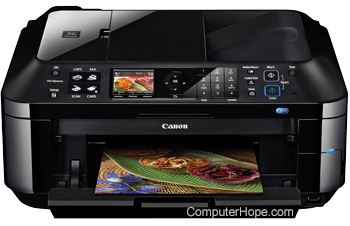How to clean an inkjet printer

Over time, inkjet printers can become dirty due to excess ink "leaking" out of the ink cartridges. Ink can build up on major components of the printer, causing the print quality to decrease. When this occurs, it may be necessary to clean the printer.
Before following any of the steps below, try the printer self-cleaning feature. All modern printers have a self-cleaning ability, usually accessed by pressing and holding one or more of the buttons on the front. If this doesn't help or if the printer needs cleaning beyond what the self-cleaning can do, try the steps below.
Cleaning an inkjet printer
To clean your printer, there are areas you must focus on:
- Print Heads
- Ribbon
- Ink Reservoir
- Stabilizer Bar
Many printers include the print heads on the ink cartridges themselves. To clean these, remove the ink cartridges from the printer. Take a piece of paper towel, fold it into quarters and apply some isopropyl alcohol to it. Then, rub the paper towel gently along the print heads on the back or underside of the ink cartridges. Running the paper towel along the print heads several times should be adequate to remove most, if not all, of the ink build-up.
Next, takes some window cleaner (e.g., Windex) and spray it on a piece of paper towel, then clean the ribbon that sits behind the ink cartridge tray. The ribbon is often white in color.
Be very careful when cleaning the ribbon. Only use minimal pressure on the ribbon or you could risk disconnecting the ribbon from the printer on either side. It is difficult to reconnect the ribbon, so be extremely gentle when cleaning it to avoid it from becoming disconnected.
Then, using a cotton swab, clean up any ink build-up in the bottom of the ink cartridge tray (the ink reservoir). If necessary, you could use a little bit of alcohol on a cotton swab to help clean up the ink.
Lastly, using some sewing machine oil or printer oil, place a few small spots of oil along the stabilizer bar, which is the bar that the ink cartridge tray slides along. Performing this process should also reduce squeaking, crunching, and grinding printer noises.
You may also want to check the paper pickup rollers in the back of the printer. Usually, printers have a back panel that opens up, allowing you to see and access these rollers. Clean these rollers with either a cotton swab with alcohol or window cleaner. You can also use some canned air to blow out any pieces of paper shreds that have built up inside the printer.
